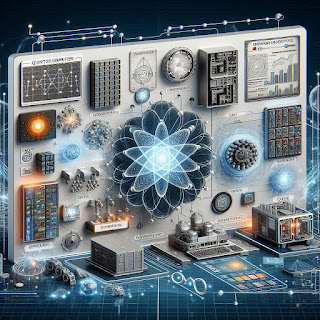Quantum Computing: The Future of Computational Power
Introduction:
Quantum computing is the new frontier of computing, performing complex calculations exponentially faster than classical computers. Whereas traditional computing relies on a binary bit for 0 or 1 states, quantum computing uses quantum bits, or qubits, existing in multiple states at once. Such unique capability in this regard also has the power to revolutionize industries such as cryptography, material science, artificial intelligence, and finance.
How Quantum Computing Works
Quantum computing is essentially based on three basic principles of quantum mechanics:
Superposition - While in classical computing a bit can either be 0 or 1, in a qubit, it can exist in a superposition of both states simultaneously. That means that a quantum computer can process multiple possibilities all at once, increasing computational speed significantly.
Entanglement: The entanglement of qubits means that the state of one qubit will relate directly to the state of another, no matter the physical distance in between. Allowing quantum computers to make highly complex calculations much quicker than could be done on a classical system.
Quantum Interference: Quantum interference is a principle allowing quantum algorithms to reinforce the right answers and cancel the wrong ones, hence enhancing computational accuracy and speed.
Quantum Computing Applications
Quantum computing will revolutionize many fields. Some of the most promising applications include:
1. Cryptography and Cybersecurity
Quantum computers could break traditional methods of encryption, thus posing a threat to current cybersecurity systems. However, they can also create unbreakable quantum cryptography protocols, such as quantum key distribution (QKD), which enables highly secure communications.
2. Drug Discovery and Materials Science
Quantum simulations can model molecular interactions at an atomic level, allowing researchers to find new medicines and materials in a fraction of the time compared to classical methods.
3. Optimization Problems
The power of quantum computing can also be used to solve tough optimization problems in logistics, supply chain management, and finance. For instance, it can be used to enhance airline scheduling, optimize investment portfolios, and improve the manufacturing process.
4. Artificial Intelligence and Machine Learning
Quantum computing does this by accelerating some aspects of machine learning algorithms because huge sizes of data are involved, and it can give importance to complex patterns much more efficiently than a classical computer does.
5. Climate Modeling and Energy Solutions
Quantum computers will be able to model complex climate systems for better predictions and solutions, optimize energy grid management, and improve battery technology and nuclear fusion research.
Challenges in Quantum Computing
Despite such promise, quantum computing faces several challenges:
Hardware Limitations: Qubits are very delicate, and their quantum state can only be sustained at extremely low temperatures; hence, quantum hardware is very hard to build and scale. Error Correction: Quantum computations are prone to errors because of decoherence and noise. Efficient methods of quantum error correction are being developed for practical quantum computing. Cost and Accessibility: Quantum computers currently cost so much to fabricate and maintain that hardly any organization in the world has access to them.
Quantum Computing in Years to Come
Governments, giant technology companies like Google, IBM, and Microsoft, as well as research organizations, have been investing big money in the study of quantum computing. Improved hardware and better algorithms mean devices currently being researched could have real-world applications in a decade or two.
Quantum Supremacy
In 2019, Google claimed to achieve "quantum supremacy," in that their quantum computer did a calculation in record time, beating the world's fastest classical supercomputers. However, despite this milestone, the real and practical applications for quantum computing remain an area of development.
Hybrid Quantum-Classical Systems
One route most researchers predict will first realize commercial viability of quantum computing consists of hybrid systems, those melding quantum with classical computing.
Conclusion
Quantum computing will revolutionize industries by solving hitherto insoluble problems. While many challenges lie ahead, continuous research and investment hint at the key role of quantum computing in the future of technology. As we draw near to practical uses of quantum, industries and governments need to be prepared for the opportunities and risks of this transformative technology.





Comments
Post a Comment